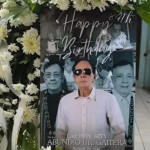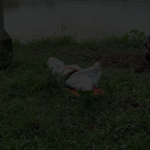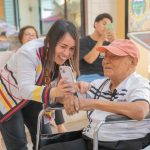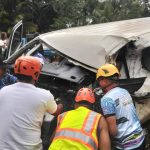In this First Person piece, Eileen Ortega-Gamo reflects on her decades of experience to call for praxis, data-driven training, and character-building as core elements in shaping relevant community development education.
To the esteemed President of Bukidnon State University, Dr. Joy Mirasol; Dr. Hazel Jean M. Abejuela, Vice President for Academic Affairs; Dr. Carina Joane V. Barroso, Vice President for Research, Extension and Innovations; Mr. Dante Victoria, Vice President for Administration and Finance; Dr. Maribel Valdez (Mam Bing), Dean of the College of Arts and Sciences; Dr. Roel Sayson, AMCDS President; Dr. Jiemalyn Paulican, University Extension Director (my inaanak); and Jose Benito C. Ronolo, Conference Head and one of my best students from 2004 (the first class I was privileged to teach and whose class gave me so much joy); warming greetings to each one of you.
I would also like to recognize the representatives of the various schools joining us in this conference, Mindanao State University-Marawi, Western Mindanao State University, Cotabato State University, University of Southeastern Philippines, Mindanao State University – Maguindanao, Cotabato Foundation College of Science and Technology and last but not the least, Tagoloan Community College.
When Benjo extended the invitation for this Conference, it didn’t take long for me to say yes, because I realized how important this conference is in terms of sharing my thoughts and learnings on how we can shape the future of community development education, from someone who has been either in the trenches, in the periphery, in ground zero of projects and in the planning and war rooms or nerve centers for the last 39 years.
One of my key sentiments when I landed my 1st job immediately after graduation was that of inadequacy. As Training Coordinator for Tambuyog Development Center, an NGO focused on providing trainings and research for fishermen organizations, I was in charge of developing training modules and implementing them across various fishermen organizations to build competencies in organization development and upscaling capacities of fisherfolks. I questioned myself if I was the right person to do this. At the time, I realized I did not know enough and I was not skilled enough. That the community development instruction in UP Diliman while good was not sufficient to prepare me in the work place. I knew a lot of theories and was taught basic training designs but not deep enough to for me to sufficiently meet the demands and standards of my job. That was how I felt. By the way, TDC was instrumental in the formation of Pamalakaya, the National Federation of Small Fisherfolk organizations in the Phils, uniting the Filipino fishers towards a genuine fisheries reform.
Don’t get me wrong, I remain grateful for having the best set of professors, Karina David, Tess Tumpalong, the late Maureen Pagaduan, Amar Torres, Lito Manalili, Elmer Ferrer who became my 1st boss. But I feel that the instruction and learnings could have been more, focusing on work and life skills that will better equip me as I took on my 1st job.
If there is one major point that I want to share is that community development education should focus on one main thing – equipping. Equipping is to prepare our students (both in knowledge and application) that will prepare them to be able to carry out their duties and responsibilities as CD practitioners with competence and excellence.
The discipline of praxis, as a methodology of teaching, is key in equipping. Praxis is the process by which a theory, lesson, or skill is enacted, realized, applied or put into practice. “Praxis” may also refer to the act of engaging, applying, exercising, realizing, or practicing ideas. Learning theories and frameworks are important. But application of these are most critical because it tests out the capacity of our students to translate theories and frameworks into action, and not only action, but action that yields positive results and creates impact.
The army do not send their soldiers, their officers to battle without equipping them for at least a few years or the very least extensive 2 yrs. They teach them theories and the art of war, strategies but they also equip them to executive tactics. You cannot send soldiers to the field with guns, without teaching them how to effectively use them by investing time in practice.
As an HR (human resource) and OD (organizational development) practitioner as well, there are key areas we need to start equipping our students intentionally. Praxis in the areas of:
- Problem-solving
- Monitoring and evaluation
- Metrics development
- Social Mobilization
- As basic as Conducting Effective Meetings
In both problem solving and monitoring and evaluation or M and E, we need to equip our students in using data to be able to understand and dissect problems (whether organization, operational) that will result to a thorough understanding of what solutions and interventions can be made to address them.
We need to equip our students in data collection tools and how to purposefully develop them, and there are several: interviews, focus group discussions, questionnaire survey and assessments. Equipping them to understand when and what conditions should warrant the use of each one. Additionally, how do we analyze data be it qualitative or quantitative or a combination of both, that will enable us to have thorough diagnosis.
Still in problem-solving, what processes and tools can we equip them with so that they are able to develop competencies in effective problem-solving. I remember teaching this is the class of Benjo which started my journey with the local government of Malaybalay.
There are several processes and tools, Force field analysis, fish bone analysis, root cause analysis, appreciative inquiry, theory of change among many tools that sharpen CD practitioners in addressing root problems rather than symptoms.
To me the heart of it is data. The more in-depth we understand the problem with data, the more targetted the interventions are. Its not always one size fits all. Sometimes it is micro-targetted solutions which best reaps impact.
In metrics development, I subscribe to what Peter Drucker, one of the best management gurus of all times, when he said “What you cannot measure, you cannot manage”.
This is so true in programs and projects. The work still of Monitoring and Evaluation or M&E is critical if our students are trained extensively on how to develop M&E tools that will facilitate measuring impact of programs and projects with evidence-based data. Example how do we measure impact of programs to address Sustainable Development Goals? What metrics are we applying? Measuring impact of programs otherwise we continue to do the same thing without any visible outcome that improves the lives of program recipients in a sustainable way.
In what I do now in the bamboo value chain, everything is measured. From the nursery, to the delivery, to the planting, to the maintenance up to the harvesting. Let me tell you about this story.
What about what seems to be so basic, conducting effective meetings. This is not only for students but even for professionals. When I do OD consulting either in private or government sector, I always tell the client not to tell me anything. I will just observe how they conduct meetings. It is when I quietly sit and watch, I am able to see dynamics that provide me a window on why many organizational problems keep on festering or remain the same agency week after week. Also any regular meeting that lasts more than an hour, may no longer be effective. But how many of us have extended meetings without visible results every week.
Lastly, embedded in our instruction and methodologies is character building. I believe CD students need to learn resilience, perseverance and humility in the course of their academic program. Good programs with significant impact takes time, for program partners like IP communities, it takes time to develop buy in and eventually ownership. As community development practitioners, we need resilience, perseverance and humility to see this process come to fruition. But unless our academic instruction involves activities and methodologies that build our students to develop these key character attributes, they will unfortunately fail in the work place or unfortunately churn out work in mediocrity instead of excellence.
Thank you very much everyone and a pleasant good morning.
Ms. Eileen Ortega-Gamo is the community development head of Rizome Philippines, leading programs with indigenous communities in Mindanao. With 38 years of experience in public and private governance, she previously served as Chief of Staff to Senator Orlando S. Mercado, contributing to the Indigenous People’s Rights Act. She is a co-founder and former CEO (on leave) of Breta Consulting Corporation. She holds a Community Development degree from UP Diliman and is a certified Organization Development Professional from Florida, USA.
She gave the piece above as the keynote speech for the Second Conference of Community Development on the theme: Shaping the Future of Community Development Education: Policies, Standards, and Guidelines (PSG) for Excellence and Relevance On May 8, 2025 in Bukidnon State University, Malaybalay Ciy, Bukidnon.
FIRST PERSON is a sub-section of BUKIDNON VIEWS, the opinion section of BukidnonNews.Net dedicated to select statements, speeches, tributes, commentaries, and other views on public matters. If you wish to contribute to FIRST PERSON, email your piece, contact details, and bio-sketch to editor.bukidnonnews@gmail.com.s.









